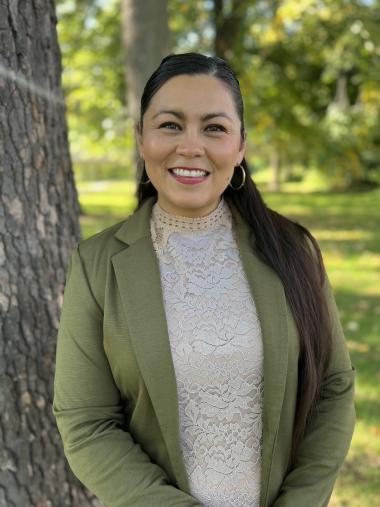Dr. Leslie D. Gonzales serves as Professor of Higher Education, Department Head of Educational Policy Studies and Practices, and Director for the Study of Higher Education.
As a working-class-Chicana-first-generation-college-student-turned academic, who earned all three academic degrees from Hispanic Serving Institutions, Gonzales is committed to the advancement of inclusion and equity in higher education, generally, and in the context of the academic profession/academic labor more specifically. She seeks to do so through her 1) research, 2) her work in academic administration, and 3) through meaningful praxis, service, and partnership.
Gonzales’s research agenda entails three lines of inquiry. Gonzales’s first line of research addresses faculty evaluation practices and processes (e.g., hiring, tenure and promotion) especially concerning the evaluation of research/knowledge production. Understanding that faculty evaluation is a deeply cultural process informed by higher education’s exclusionary histories, Gonzales seeks to understand how faculty members create (or gatekeep) space for new knowledge, particularly when such knowledge may unsettle dominant ways of knowing. In this line of scholarship, Gonzales is constantly seeking to understand the conditions, mechanisms, and processes that support epistemic inclusion. Gonzales’s second line of research addresses the organizational and structural contexts in which academics work and learn to do their work, including their teaching, research, and evaluative work. From graduate school to the academic disciplines, to the organizational sites in which academics are situated – each represent powerful opportunities to reform how academics think about and go about their work. Yet, each of these sites is also laden with forceful histories and norms that tend to reward conformity and foreclose more inclusive possibilities. Through this line of scholarship, Gonzales is interested in uncovering opportunities to create and leverage more inclusive organizational structures, cultures, and leadership. Finally, Gonzales’s third line of research is more directly concerned with the experiences, contributions, and outcomes of historically minoritized and marginalized academics. Gonzales is especially interested in documenting the intellectual contributions of women of color, scholars educated in marginalized institutional types (e.g., Hispanic Serving Institutions), or in marginalized academic disciplines.
Over the years, Gonzales has had the privilege of collaborating with many student authors and colleague co-authors. She is deeply grateful for the learning she has been able to do with so many others. Gonzales’s work has been funded by the National Science Foundation and she is published in many outlets, including The Journal of Higher Education, The Review of Higher Education, Teacher’s College Record, and the Review of Education Research. She has served in several national leadership roles, including as member of Council for Women in Science, Engineering, Mathematics, and Medicine, as the 2023 Inaugural Conference Chair for the Association for the Study of Higher Education, as 2019 Program Chair for the Association for the Study of Higher Education, and as member of AERA’s Executive Committee of Scholars of Color. Before coming to the University of Arizona, Gonzales served as a Professor and Faculty Advocate at Michigan State University—a role that allowed Gonzales to bring empirical research, theory, and practice together to advocate for a more inclusive academic profession.
Although Gonzales is grateful for the opportunity to advance knowledge and work with wonderful collaborators, her most important and favorite roles are that of life partner to her husband, Ruben, mother to her daughter Sudeshna, daughter to her parents Thomas and Louise, sister to Tommy, and friend to those with whom she is fortunate to be in community.


